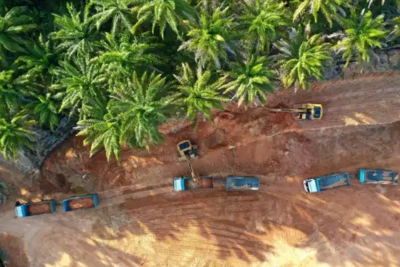Rappler| 24 July 2024
Negros Occidental farmers seek help over P2-billion palm oil project threat
Ambo Delilan
 Organized farmers say the project could displace over 1,000 families, including members of indigenous communities, living in three barangays in Candoni, Negros Occidental
Organized farmers say the project could displace over 1,000 families, including members of indigenous communities, living in three barangays in Candoni, Negros OccidentalFarmers cried out for help on Tuesday, July 23, as a P2-billion palm oil plantation project threatened to displace them and their families in three villages in Negros Occidental.
The Gatuslao Agro-Forestry, Banana, and Sugarcane Farmers Association (GABASFA) said about 100 farming families in Candoni town, Negros Occidental, were adversely affected when ground works for the project commenced, destroying several farms in the villages of Agboy, Gatuslao, and Payawan.
Carlito Catacata, GABASFA president, said heavy equipment from the Consunji group’s Hacienda Asia Plantation Incorporated (HAPI) are destroying farms planted with corn, pineapple, sugarcane, and vegetables.
In 2023, Candoni Councilor Dember Catipunan said there were plans to convert around 6,000 hectares of forest land in the town into a palm oil plantation, with the Consunji group entering into an Integrated Forest Management Agreement with the Department of Environment and Natural Resources (DENR) for the project.
Catacata said the ongoing project could displace over 1,000 farmers and their families, including members of indigenous communities, living in the three barangays.
GABASFA said HAPI started developing 6,652 hectares for its palm oil plantation, comprising forest lands regarded as public domain, based on a 25-year IFMA with the DENR.
An IFMA is a contract entered into by the DENR to give an applicant the exclusive right to develop, manage, protect, and use a specific area of forestland and its resources for 25 years. The agreement can be renewed for another 25 years, following sustainable development principles and an approved community-based development and management program (CDMP).
The IFMA was first granted to former Bacolod representative John Orola for cassava and jatropha plantations more than 20 years ago. It was later transferred to the Araneta family and eventually to HAPI.
Catacata said the company’s executives, along with Candoni Mayor Rey Ruiz and other local officials, had promised not to destroy or intrude upon the areas the farmers have cultivated for decades during a public consultation in May 2023, acknowledging that the pieces of land they occupy were passed on to them by their ancestors.
Many of the families, he said, have been living and cultivating farms in the villages for 60 to 70 years already.
“DENR officials in the province and Kabankalan City promised to give us an IFMA to legitimize our farming ventures in the area. This has not happened,” Catacata said.
Rappler reached out to Ruiz on Tuesday evening, but he said he was not ready to comment yet. HAPI has also yet to issue a statement as of posting time. This report will be updated once they issue statements.
Ruiz, however, is set to meet with the affected farmers at the town hall on Friday, July 26.
Catacata said the farmers have sought legal aid so they could petition for the immediate revocation of the IFMA between HAPI and the DENR.
GABASFA and the affected farmers have found an ally in the environmental watchdog Negros Initiatives for Climate and Environment (NICE). The group’s convenor, Joshua Villalobos, said they were opposed to the project in Candoni, saying it would lead to deforestation, soil erosion, and cause landslides, flooding, and other natural calamities.
Candoni, one of the smallest and poorest localities in Negros Occidental, located about 147 kilometers from Bacolod, was one of the worst-hit towns when Super Typhoon Odette (Rai) battered the southern part of the province on December 16, 2021.
Frank Carbon, chief executive officer of the Metro Bacolod Chamber of Commerce and Industry (MBCCI), said the project promises to be a game changer for Negros Occidental’s economy.
Villalobos, however, disagreed, saying the palm oil plantation project could be a bane for the local economy in the long run.
“We maintain our position that we must not over-glamorize this big-ticket project, and we need to ensure that it complies with regulations and does not sacrifice environmental integrity and the rights of people in the communities,” he said.












